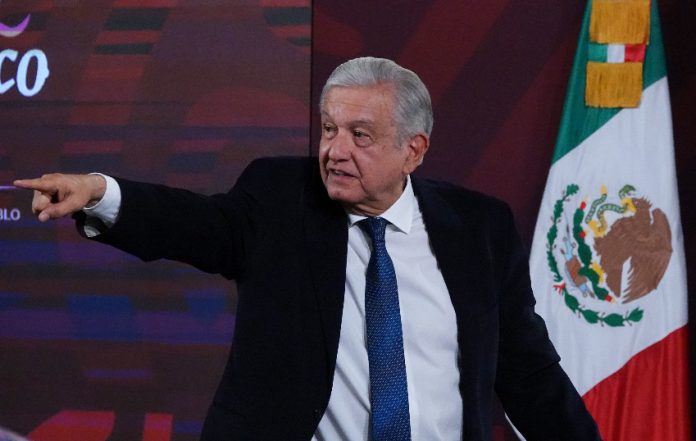President López Obrador triggered an outburst of positive and negative responses when he highlighted the natural beauty of Quintana Roo and the construction of two government infrastructure projects in the same social media post last Saturday.
“It’s not a dream, it’s a nightmare for nature,” one Twitter user wrote in response to AMLO’s publication of a photo showing “beautiful little lagoons close to where we’re building the new Tulum airport.”
Bellas lagunitas cercanas a donde estamos construyendo el nuevo aeropuerto de Tulum. Llevamos dos días de supervisión de avances del Tren Maya, que es como un sueño que pronto, muy pronto, se volverá realidad. pic.twitter.com/cBIdt3xOVE
— Andrés Manuel (@lopezobrador_) March 26, 2023
AMLO shared this image of lagoons near the site of the new Tulum airport last Sunday
In the same post, the president said that the Maya Train railroad project – which will connect cities and towns in five southeastern states – is “like a dream that … very soon will become reality.”
The dichotomy between the comments praising the president for his commitment to carrying out transformative infrastructure projects and the remarks accusing him of defiling Mexico’s natural environment was not surprising.
Politically speaking, Mexico is a divided country, and that polarization is perhaps more evident on social media than anywhere else. Much of the public debate, online and offline, stems from AMLO’s discourse at his lengthy weekday morning press conferences, or mañaneras, exercises in oratorical – and auditory – stamina held mostly in the National Palace.
Monday
During the weekly update on the construction of the Maya Train railroad, the head of the National Tourism Promotion Fund reported that “significant progress” has been made on the 234-kilometer section between Escárcega and Calkiní in the state of Campeche.
“There are 80 kilometers of tracks completed and we already have 100% of the ballast, rails and sleepers required,” said Javier May Rodríguez.
“The drainage works are 70% complete, the 10 viaducts under construction are 60% complete and we already have half of the 148 pedestrian, vehicle and wildlife crossings we need. … All this has created 12,000 jobs,” he said.
“Traveling in the train along section 2 will allow [passengers] to visit and enjoy emblematic places like the historic city of Campeche, the Champotón River, the archaeological zone of Edzná and the Hecelchakán Museum, to name some of the marvelous places in Campeche. And of course … [passengers] will be able to enjoy the gastronomy and handicrafts of our amigos y amigas campechanos,” May added.
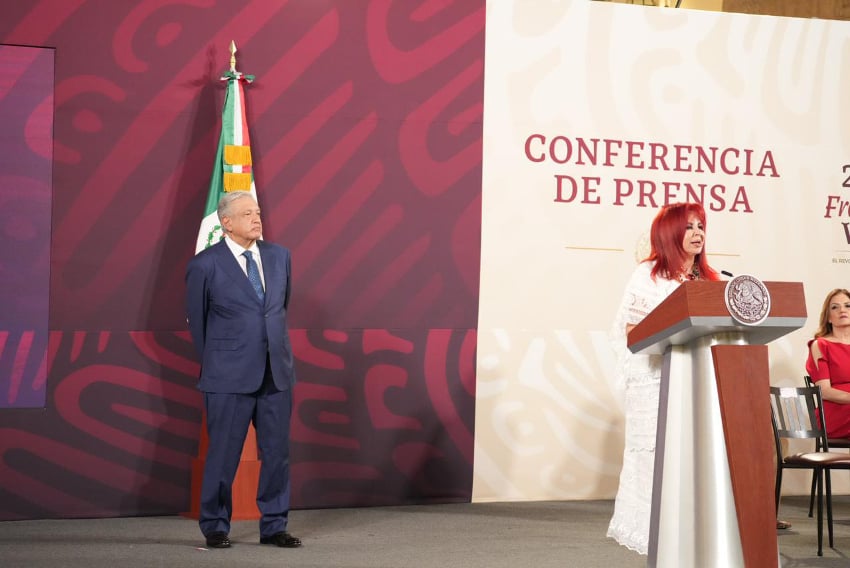
During a theatrical appearance before reporters, Campeche Governor Layda Sansores – an ardent AMLO ally – declared that the ambitious 1,500-kilometer-long railroad will be completed on time in December because the project was “predestined.”
“Its destiny was written on the bark of the ancient ceiba trees,” she said.
“… Let the thunder of the train reverberate on the [Yucatán] Peninsula. Let’s get on the train – we’ll discover the splendor and power of our Mayan culture, we’ll find another world of redemption and hope,” the governor gushed.
“Thank you, Andrés, president, for giving us the opportunity to write a line in the long history of peaceful and eternal battles you’ve led. Andrés Manuel, son of corn and restorative lightning, son of the four cardinal points, he who carries 32 suns in his soul, never forget how much your people love you.”
The object of Sansores’ affection returned to center stage to take reporters’ questions, and was immediately asked about the suspension of the government’s “Plan B” electoral reform laws by Supreme Court Justice Javier Laynez Potisek.
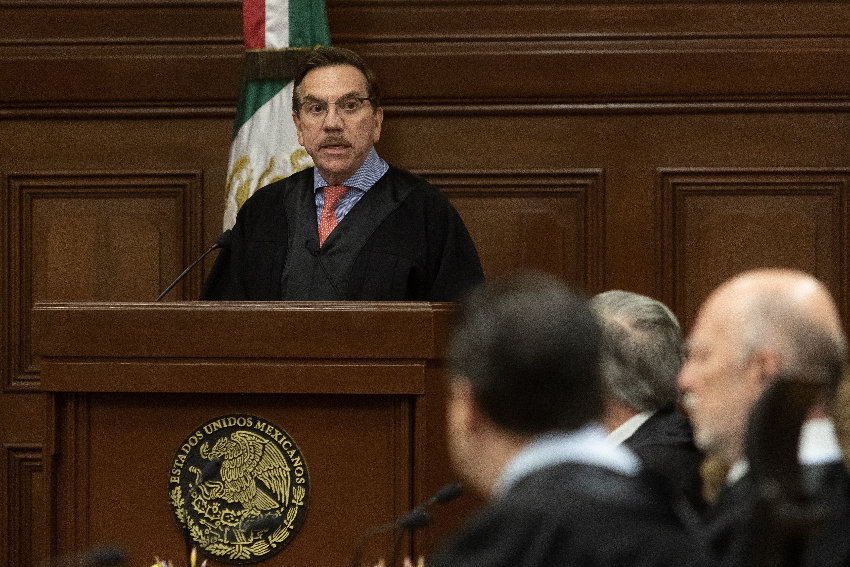
“It’s thought that this justice overstepped the mark, went too far,” López Obrador said.
“… There can be interpretations of the constitution, of laws, but in reality that’s what he did. The important thing is to know why [judges] act in this way. I believe that the majority of people know that it’s not a legal matter, it’s a political matter and I would say a commercial matter because what they don’t want is for the electoral law to be approved or declared constitutional. What they don’t want is for the salaries of the high-ranking National Electoral Institute [INE] officials to be reduced,” he said.
“That’s what it comes down to; that’s what the ‘Don’t touch the INE’ [protest movement] is about.”
Responding to another question, AMLO praised Constellation Brands for accepting the result of a 2020 referendum on a brewery the United States company planned to build in Mexicali, Baja California.
“They’re [now] building the brewery in Veracruz, near the port. … The owners of this company behaved very well because they were surprised to some extent, deceived by previous authorities who gave them permits when there was no water available,” he said.
“They thought there wasn’t going to be a problem but clearly there was a problem because the people of Mexicali didn’t agree. The consultation was done, the people reaffirmed that they didn’t want the brewery, we spoke with the owners … and they accepted the move … to a place where there is water.”
In response to the final question of the presser – What’s your schedule today, Mr. President? – López Obrador revealed that he is not as au fait with his day-to-day agenda as one might expect.
“We have some things, I don’t remember well,” he said reluctantly before flashing a broad grin.
Tuesday
López Obrador acknowledged at the beginning of his presser that 39 migrants had died in a fire in a government-run detention center in Ciudad Juárez, Chihuahua. It appeared that migrants set mattresses alight when they found out they were going to be deported or moved, he said.
“It’s very sad that this happened,” AMLO said after noting that the names and nationalities of the victims had not yet been established.
(Migrants from Guatemala, El Salvador, Honduras, Venezuela and Colombia were subsequently confirmed to have died.)
Education Minister Leticia Ramírez later announced that the government was launching “a campaign against addictions” that would be mainly directed at middle school and high school students
At least three days a week students will receive information from teachers about the harm caused by drug use, she said.
Ramírez ran through a list of brief but blunt messages that will be conveyed to students during the campaign: “fentanyl will kill you straight away; methamphetamine hooks you; vapes really are toxic; cannabis harms you; tobacco affects you and everyone; alcohol, be careful, don’t start; benzodiazepines aren’t a game.”
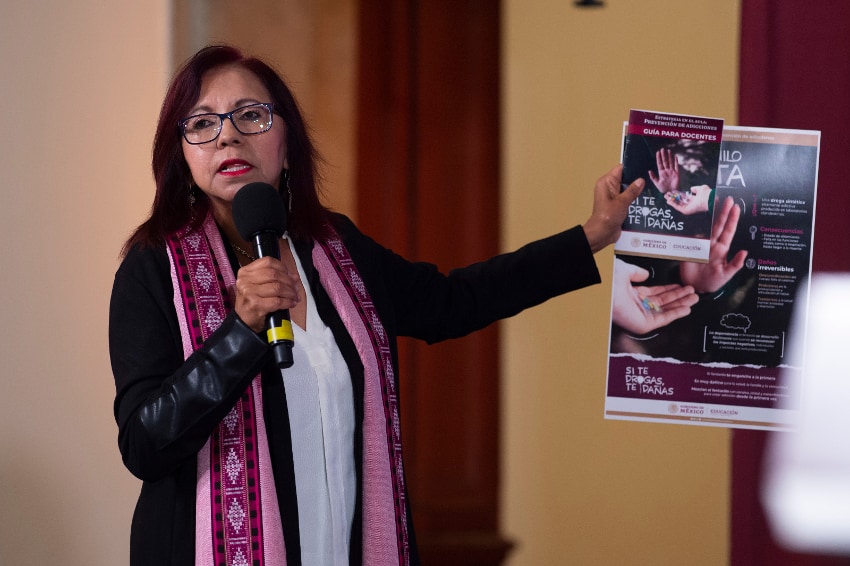
After López Obrador expressed his support for the campaign, Culture Minister Alejandra Frausto took center stage and reported that 11,505 Mexican archaeological pieces have been repatriated since the federal government took office in late 2018.
“We want to thank … the management of museums in other countries [and] citizens who had these assets in their homes for some reason – maybe they inherited them, but they became aware that they don’t belong to them,” she said.
Frausto also expressed gratitude to the governments of European countries that have returned artifacts to Mexico, including that of Italy, which recently handed over 43 pieces.
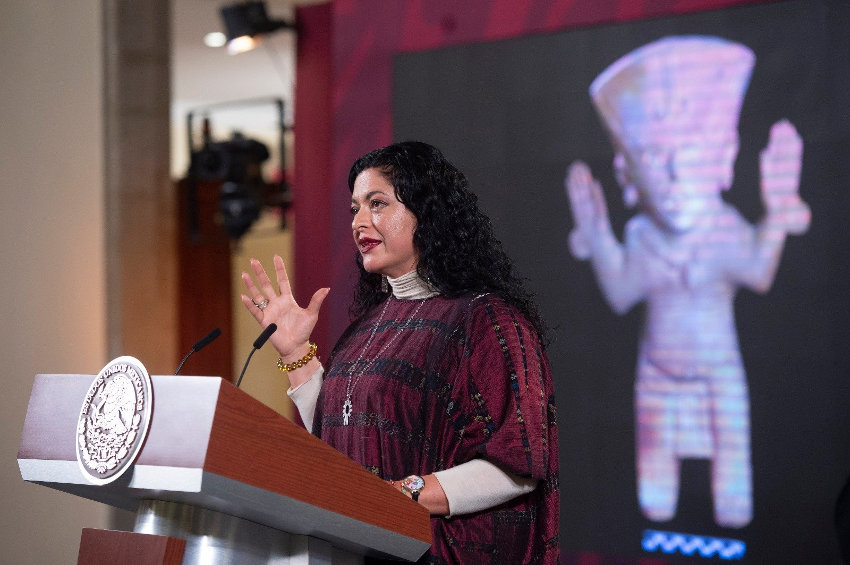
Back in his element in front of a gaggle of eager reporters, AMLO declared that his government needs to “continue seeking the purification of public life” after 36 years of neoliberal policies implemented by the past six governments.
“We’re talking about 1983 to 2018. … This predominance of neoliberalism … penetrated deeply … [in] all aspects of public life,” he said during a prolonged response to a question about the need for judicial reform.
Among other remarks, AMLO said that “the family is the most important social security institution” in Mexico because of the support members can provide to each other and noted that he had a “very good” meeting on Monday with the lawyer for Pedro Castillo, the former president of Peru who was ousted by that country’s Congress late last year.
“He’s defending the case well. He explained to me that there is no legal foundation for what they did. In other words they acted at the margins of – and above – the law,” he said.
Wednesday
At the top of his presser, López Obrador expressed his condolences to the family members of the men who were killed in the Ciudad Juárez detention center fire and to the residents and governments of the Latin American countries from which they came.
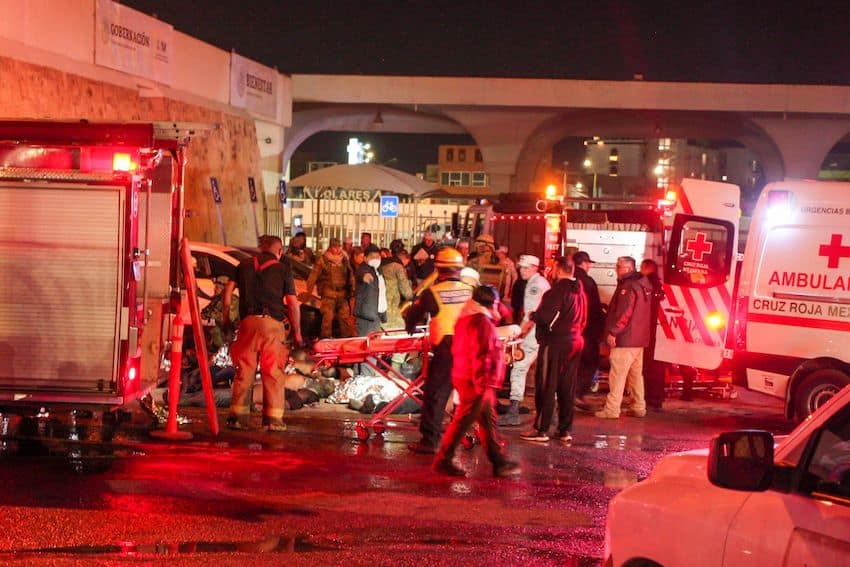
He said that the Federal Attorney General’s Office was conducting an investigation and pledged that his government wouldn’t “hide the facts.”
“In the face of this [tragedy] that is so painful and so sad for us, we’re not going to act unfairly in any way,” AMLO said.
After various officials presented a bombardment of statistics, including ones related to pensions for seniors (11.2 million recipients), the “Youths Building the Future” apprenticeship scheme (2.6 million participants in the past four years) and the government’s “Internet for Wellbeing” program (20,508 rural localities connected), fake news finder Ana García Vilchis made her regular Wednesday appearance to present another edition of her “Who’s who in the Lies of the Week” segment.
After defending the integrity of the government’s scholarship scheme for students in the wake of a report that questioned the whereabouts of more than 1.6 billion pesos in funding, she took aim at “opposition media outlets” that have reported on flooding at the new Pemex refinery on the Tabasco coast.
“Time and again they falsify information, publishing photos that don’t correspond, doing photomontage, reviving old lies and rehashing false information – a complete cocktail of disinformation,” García said.
She also denounced reports that claimed that Wells Fargo wouldn’t allow remittances to be sent to the government’s Bank of Well-Being due to the latter’s lack of anti-money laundering controls.
“It’s completely false. … In this respect, the … [Bank of Well-Being] clarified that it stopped receiving … remittances from all banks on Feb. 28,” she said.
Reentering the fray, AMLO directed some of his ire at senior judges and high-ranking electoral officials who earn “double or triple” his salary (about US $9,600 per month gross) despite the constitution saying that no public servant can make more than the president.
“They violated the constitution through an injunction, legal chicanery,” he said before noting that he did succeed in eliminating exorbitant pensions for past presidents.
“How much did they give Fox, Calderón, Salinas, all of them? About 5 million pesos a month,” López Obrador said.
During a subsequent engagement with a storied mañanera figure, a reporter known as Lord Molécula (real name Carlos Pozos), AMLO’s mind suddenly turned to Mexican cinema and specifically a new film called ¡Que viva México!
“I was watching a movie, a churro [dud] against us, … [a film] for the consumption of the conservatives,” he said before going on to explain why he isn’t a big fan of cinema.

“I regret [not being a fan] because [cinema] is something exceptional, it’s art, … but perhaps due to the reality in which I live I don’t need more drama. My reality, my experience, is very rich,” the president said.
Among other remarks, AMLO once again asserted that Mexico is a largely safe country as he sought to refute recent comments regarding cartel control made by members of U.S. President Joe Biden’s cabinet.
“I maintain that I, as president, and any person can go to any part of [Mexico’s] national territory,” he said. “Yes, there are more risks in some regions and cities than others, but life goes on unchanged in the entire country.”
Thursday
Members of the Consejo de la Communicación (Communication Council) – a private sector group that aims to raise awareness about social problems and help solve them – were guests of honor at López Obrador’s Thursday press conference.
Francisco Casanueva Pérez, who assumed the presidency of the council at the mañanera, declared that Mexico is facing “significant economic, social and environmental challenges” and asked the president to “allow us to continue joining forces with the federal government” to tackle them.
“We have a shared vision of achieving the wellbeing of society and the progress of our country,” Casanueva said. “Working together – the public sector and the private sector – we can reach our goals.”
Continuing the love-in, López Obrador said that the work of the council – which ran a pro-vaccine campaign during the pandemic and has supported other public health initiatives – is “highly renowned.”
“I want to thank [the council members] for what they did for our people in very difficult times, when we were facing the COVID pandemic in very difficult and sad circumstances. We all joined together and managed to save many lives,” he said. “… This is a council with a social dimension, a civic dimension.”
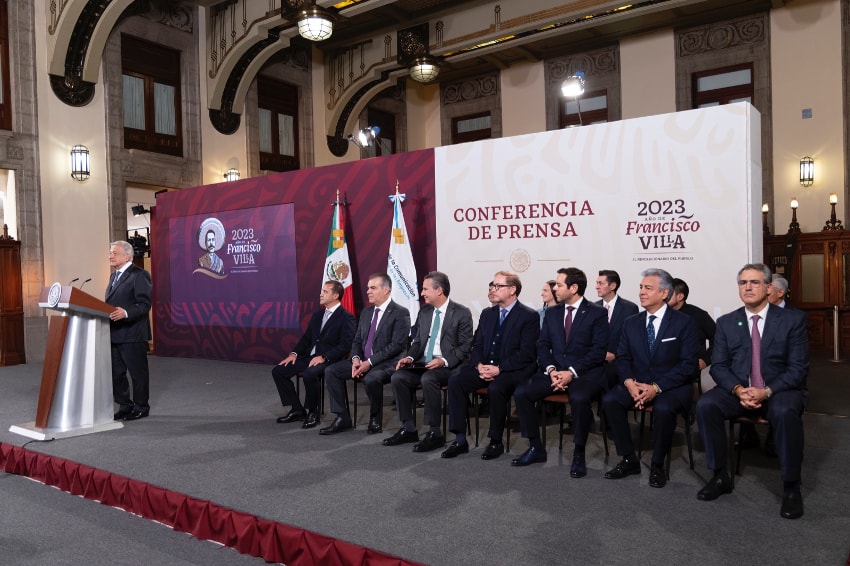
Before opening up his presser to questions, López Obrador ran through a range of economic data, highlighting low unemployment, wage growth for formal sector workers, the strength of the peso and record-high remittances, among other favorable pieces of information.
He acknowledged that inflation is a “concern,” but stressed that the scourge is now declining.
During his engagement with reporters, AMLO noted that he had spoken with National Immigration Institute director Francisco Garduño since the detention center fire, but offered no details about the conversation. Asked whether Garduño would remain in his position, the president said that the government would wait for “the result of the investigation” before making any decision.
He later turned his mind to the importance of eating well and exercising. Eating a healthy diet and doing sport is “preventative medicine,” said the 69-year-old heart attack survivor.
“And prevention is better than cure. … We can have specialist hospitals but the best thing is for people not to get sick and we can achieve that with good eating habits, with exercise, by looking after ourselves and that’s why we have this [healthy eating] campaign,” he said.
“… There are other important issues. Water, for example, is extremely important,” AMLO added.
“… We already have problems with a shortage of water in the country and we have to look after water, both surface and subterranean water. There are areas in the country with water stress – there’s no water in other words,” he said.
Friday
Right off the bat, AMLO was asked about the election of Guadalupe Taddei Zavala as president of the National Electoral Institute (INE). He promptly noted that her election and that of three new electoral councilors occurred via sortition, or selection by lottery.
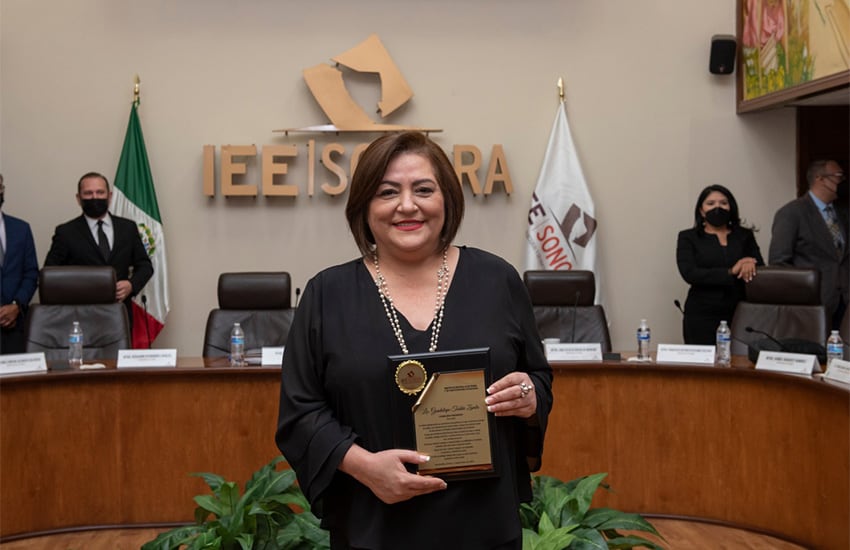
Compared to the “bad habit of dividing the positions between the parties, this is a more democratic way of choosing,” he said. “In ancient Greece this method was used as well, it was part of democracy.”
López Obrador went on to describe Taddei – who has family links to the government – as an “experienced, professional and honest” woman who is “incapable” of acting like outgoing INE chief Lorenzo Córdova, a noted foe of the president. He dismissed a suggestion that the INE was being taken over by the ruling Morena party.
The president was later asked about his exhortation on Monday for citizens not to vote for “the conservatives.”
The INE ruled on Thursday that his remark threatened equity in upcoming elections in México state and Coahuila and ordered the removal of the relevant section of his mañanera from the internet.
AMLO charged he didn’t do anything wrong, although the government has removed Monday’s presser from its websites and social media pages.
“To say ‘not one for vote for conservatism’ is not to say ‘not one vote for PRIAN,'” he said, using a hybrid acronym for the Institutional Revolutionary Party, or PRI, and the National Action Party, or PAN, political allies that are sometimes accused of being one and the same.
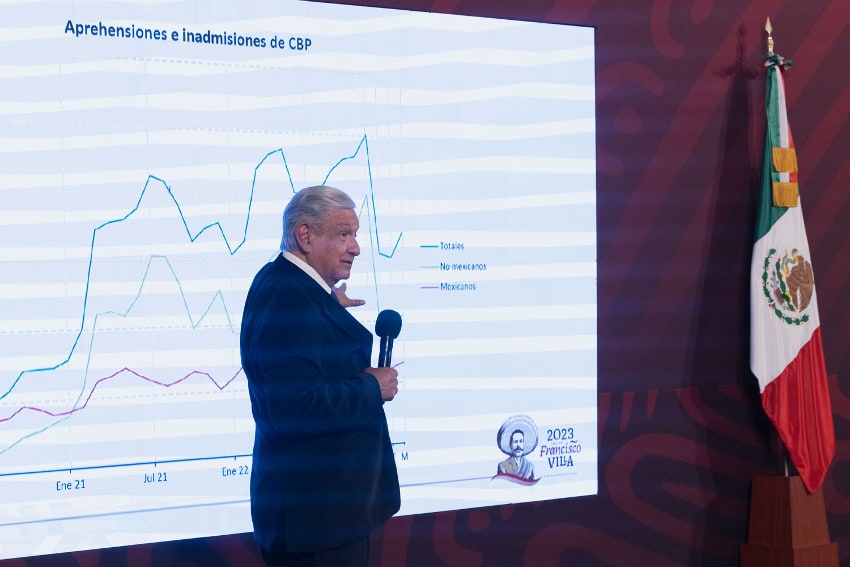
“If they put on the [conservative] jacket, that’s another thing. There’s not a formal conservative party, right?”
The president put politics aside to discuss the Ciudad Juárez tragedy, noting that he would travel to the border city and meet with the doctors treating the injured migrants.
“I’m going to have a meeting with the doctors to ensure they don’t lack anything, so that we can save lives. That’s the essential thing now,” he said.
“… This case has been very painful for a lot of people. And I confess it has pained me a lot, it has hurt me. I’ve had difficult moments [as president], the most difficult was the explosion in Tlahuelilpan,” AMLO said, referring to the 2019 petroleum pipeline blast in Hidalgo that claimed well over 100 lives.
“That was the hardest event, the one that affected me the most emotionally. And then this, this moved me, it broke my soul.”
By Mexico News Daily chief staff writer Peter Davies ([email protected])
